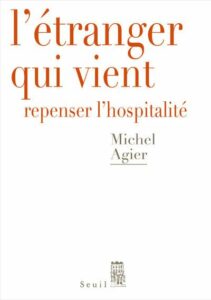Share
Online survey led in November 2022
Number of responses: 101
International student flows are considered as highly skilled migration and are generally very much encouraged by the host countries as a source of cultural and social exchange between countries. However, in some countries the phenomenon is so widespread that it represents an overload and an additional cost for universities and governments, especially when the flow of students is not reciprocal.
This can be considered as the case in Belgium for French students. Indeed, in recent years, more and more French students have chosen, voluntarily or forced, to go to Belgium for their studies.
In 2020, there were 20,000 French students enrolled in Belgian higher education[1] (particularly in French-speaking regions), which represents half of the total number of foreign students in the country. In comparison, France only welcomes about 4,500 Belgian students in its universities each year (Belgians do not even appear in the top 15 nationalities of foreign students in France).
101 French students currently studying in Liege and Brussels answered this questionnaire in order to highlight the trends of this phenomenon, the profile of these young French students as well as the reasons for their departure to Belgium.
1 – “In which field are you studying?”
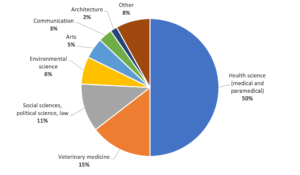
The graph shows that half of the students surveyed are studying health sciences in Belgium. This includes medicine, dentistry, speech therapy, audiology and physiotherapy. Veterinary medicine, also considered as a health science, is represented separately on the graph and also represents a large part of the surveyed sample. It is very interesting to observe this trend because these are the disciplines in which the influx of French students has been so great in recent years that Belgium has imposed a 30% quota of non-resident students. Nevertheless, these fields of study seem remain the preferred choice of the students and we will see why in the following questions.
2 – “How did you get into the program?”
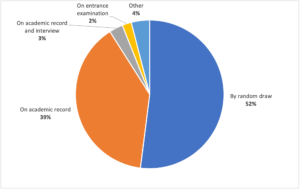
Depending on the field of study, there are different ways for students to enter. Here we observe that 52% of the students have been admitted in Belgium by drawing lots, a process proposed in Belgium in the health fields to ensure the respect of the 30% quota. The students have between 20 and 35%[2] chance of success to be drawn by lot depending on the university. Then, as in France, a large part of the students were selected on the basis of their academic record. In France, this is a much more widespread process than the drawing of lots, which only concerns certain Parisian medical schools where the demand is too great.
3 – “Why did you come to Belgium to study?” (multiple choice)
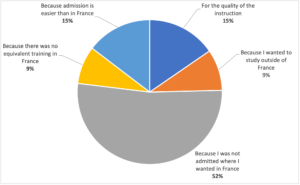
From this graph we can see that Belgium appears for 52% as a second choice after having been refused in France. This is the case for many medical students in France where even the most motivated have a lot of difficulty passing the PACES year (common year of selection to continue health studies) and being well enough placed at the end-of-year exam to access the desired fields. This coincides with the 15% of students who indicate that they are in Belgium because the selection procedure is easier than in France. However, if Belgium is for many an emergency solution, it seems that it does not provide any less quality education as indicated by the 15% of the graph.
4 – “Are you satisfied with your studies in Belgium?”
Rate your answer on a scale of 1 (being “very unsatisfied“) to 5 (being “very satisfied”)
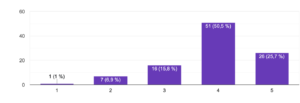
5 – “What are the main advantages of studying in Belgium?” (multiple choice)
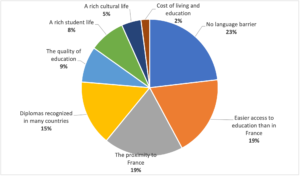
The advantages that French students find in Belgium are numerous, the first being the absence of a language barrier (23%). Indeed, the majority of French students choose the French-speaking regions of Belgium for their studies, as is the case for students surveyed studying in Liege and Brussels. The other main reasons are proximity to France (19%) and easier access to training, which coincides with the findings of the previous questions. The students also underline the fact that the diplomas obtained are recognized in many countries such as France.
Julien Nicaise, administrator of ARES, underlined in this regard in 2019 “the great attractiveness of our higher education which offers, in the heart of Europe, quality training, open and accessible, and at a relatively reasonable cost compared to what is practiced in neighboring countries“[3].
6 – “If you had had the choice, would you have preferred to stay in France to study?”
Rate your answer on a scale of 1 (being ” Yes, I would have preferred to stay in France “) to 5 (being ” No, I would not have preferred to stay in France “)

If students are overall rather satisfied with their studies in Belgium, 49% of them would have preferred to stay in France for their studies, which underlines the tendency that Belgium for studies remains a second choice.
7 – “After your studies do you plan to stay and work in Belgium?”
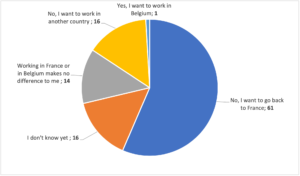
If 30% of the students surveyed do not yet have a precise idea of where they want to work after their studies, 61%, therefore the majority of students surveyed intend to return to France once they graduate to work there. This represents a real shortfall for Belgium, which spends money to train professionals, mainly health professionals, who will not enter the Belgian labor market. This is a real problem, especially for the health sector because the Covid-19 crisis has highlighted a real shortage of health professionals in Belgium.
Footnotes
[1] https://www.ares-ac.be/fr/presse/588-1-152-personnes-non-residentes-tirees-au-sort-pour-acceder-aux-filieres-contingentees-de-l-enseignement-superieur
[1] https://www.courrierinternational.com/article/belgique-20-000-etudiants-francais-dans-le-superieur-cest-trop
[2] https://www.ares-ac.be/fr/presse/588-1-152-personnes-non-residentes-tirees-au-sort-pour-acceder-aux-filieres-contingentees-de-l-enseignement-superieur


